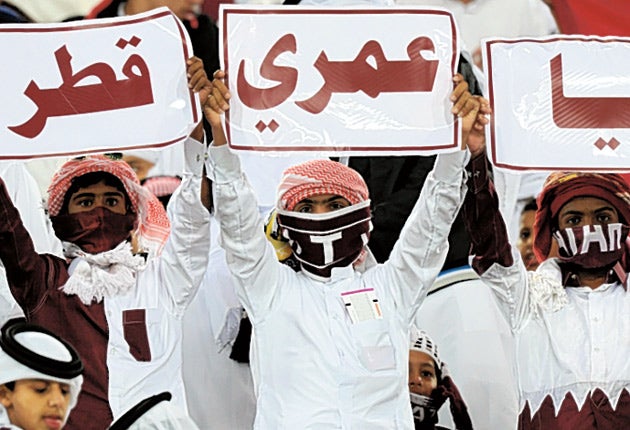James Lawton: A desert storm of the disingenuous cannot hide Platini's howling error
Qatar has neither a football tradition nor until now, a burning aspiration to have one

You had to be in the new-build, mini-city of Doha, and then fly out over the desert and encounter the first notable break in the sand, a huge gas storage installation, to properly grasp the scale of the outrage.
Now when the cracks in Qatar's hosting of the 2022 World Cup are becoming so visible and Fifa president Sepp Blatter and his acolyte, the Uefa chief Michel Platini, respectively speak of wrecking the schedules of European football by moving it to January – against the wishes of Mohammed Bin Hammam, the power behind Qatar's successful bid – and then spreading the tournament across the Gulf, the disgust and disbelief can only bite the harder.
Platini is nobody's fool. His pressure for economic reform in European football has to be welcomed by anyone who understands that almost anything would be better, and less stomach-turning, than the game's own rapacious and madcap version of laissez-faire.
So of course he knows that more than a few wisps of sand blow beneath his feet when he tries to rationalise the most grotesque piece of maladministration in the history of the world's most popular game.
Indeed, the result is a desert storm of the disingenuous, especially when he cites a spurious precedent for his plan to spread the World Cup to such other hotbeds of football culture as Dubai and Abu Dhabi and Bahrain.
Here is Platini on why no one will care in 11 years' time if there are radical changes to the bid that was voted home in Zurich last month, "Who will remember the words? When I organised the World Cup in France [in 1998] we did things differently from what we proposed in the bid."
Sacré bleu, Michel, we are not talking about details, we are discussing the fundamentals of a World Cup and its basic need to be placed in an appropriate environment. I don't know how extensively the French blueprint was changed, only that the tournament was a joy to attend, at least when you could put a little distance between yourself and the ravening English morons who parked themselves in the old port of Marseilles and provoked the tear gas which filled my hotel room from time to time.
The French World Cup was brilliant for many reasons but mostly because it was set in an appreciative culture. Wherever you were, in a square in Montpellier watching Zinedine Zidane sent off on the big screen, or in the Stade de France or Lille or St Etienne, where Michael Owen scored that goal, and, most memorable of all, on the Champs-Elysées the night Les Bleus won the great prize and they ran out of certain drinks and hot dogs in Harry's Bar.
You could say something of the same of the tournaments in South Africa last summer and in Germany in 2006 and Japan and South Korea in 2002. We moved from new worlds of football to old, but the linkage was a vast enthusiasm. You cannot create such passion, vast or otherwise, in a desert enclave with neither a tradition, nor until now, a burning aspiration to have one.
In 1978, in Argentina the worry was that the home nation's success would rebound favourably on the government of the generals but Ian St John saw it entirely as a triumph for the enduring magic of football when he walked for hours through the streets of Buenos Aires after the defeat of a fine Netherlands team in the final. "I danced with an old lady in the street," reports St John.
It would be too hot in Qatar and he might just get arrested.
Subscribe to Independent Premium to bookmark this article
Want to bookmark your favourite articles and stories to read or reference later? Start your Independent Premium subscription today.

Join our commenting forum
Join thought-provoking conversations, follow other Independent readers and see their replies